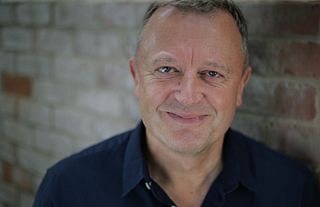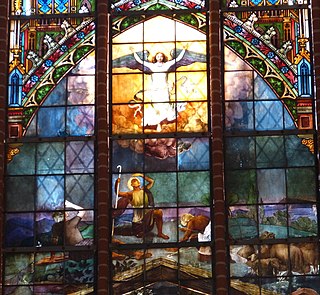Related Research Articles

Sir John Milford Rutter is an English composer, conductor, editor, arranger, and record producer, mainly of choral music.

Gabriel Fauré composed his Requiem in D minor, Op. 48, between 1887 and 1890. The choral-orchestral setting of the shortened Catholic Mass for the Dead in Latin is the best-known of his large works. Its focus is on eternal rest and consolation. Fauré's reasons for composing the work are unclear, but do not appear to have had anything to do with the death of his parents in the mid-1880s. He composed the work in the late 1880s and revised it in the 1890s, finishing it in 1900.

Patrick Hawes is a British composer, conductor, organist and pianist.

Kanon Pokajanen is a 1997 composition by Arvo Pärt for four-part (SATB) choir. The text is the "Canon of Repentance to Our Lord Jesus Christ", an Orthodox hymn. The text is sung in Church Slavonic and following the tradition of Russian sacred choral music, it is sung a cappella.

Carols for Choirs is a collection of choral scores, predominantly of Christmas carols and hymns, first published in 1961 by Oxford University Press. It was edited by Sir David Willcocks and Reginald Jacques, and is a widely used source of carols in the British Anglican tradition and among British choral societies. A second volume was published in 1970, edited by David Willcocks and John Rutter, and the collection is now available in six volumes. A compendium edition was published later. In addition to music for Christmas, the collection also offers works that are suitable for other Christian festivals such as Advent and Epiphany.

Jesu, meine Freude, BWV 227, is a motet by Johann Sebastian Bach. The longest and most musically complex of Bach's motets, it is set in eleven movements for up to five voices. It is named after the Lutheran hymn "Jesu, meine Freude" with words by Johann Franck, first published in 1653. The motet contains the six stanzas of the hymn in its odd-numbered movements. The hymn tune by Johann Crüger appears in all of these movements in different styles of chorale settings. The text of the motet's even-numbered movements is taken from the eighth chapter of the Epistle to the Romans, a passage that influenced key Lutheran teachings. The hymn, written in the first person with a focus on an emotional bond with Jesus, forms a contrasting expansion of the doctrinal biblical text. Bach set both texts alternating with and complementing each other, in a structure of symmetries on different layers.

John Rutter's Requiem is a musical setting of parts of the Latin Requiem with added psalms and biblical verses in English, completed in 1985. It is scored for soprano, mixed choir and orchestra or chamber ensemble.
A Gaelic Blessing is an English language choral composition by John Rutter, consisting of four vocal parts (SATB) and organ or orchestra. It is also known by the repeating first line of the text, "Deep peace". The work was commissioned by the Chancel Choir of First United Methodist Church, Omaha, Nebraska, for their conductor Mel Olson. It was published first in 1978 by Hinshaw Music, by Oxford University Press and by the Royal School of Church Music.

Johann Sebastian Bach composed the church cantata Ich hatte viel Bekümmernis, BWV 21 in Weimar, possibly in 1713, partly even earlier. He used it in 1714 and later for the third Sunday after Trinity of the liturgical year. The work marks a transition between motet style on biblical and hymn text to operatic recitatives and arias on contemporary poetry. Bach catalogued the work as e per ogni tempo, indicating that due to its general theme, the cantata is suited for any occasion.
"Song for Athene" is a musical composition by British composer John Tavener with lyrics by Mother Thekla, an Orthodox nun, which is intended to be sung a cappella by a four-part choir. It is Tavener's best known work, having been performed by the Westminster Abbey Choir conducted by Martin Neary at the funeral service of Diana, Princess of Wales, on 6 September 1997 as her cortège departed from Westminster Abbey.

Angels' Carol is a popular sacred choral piece by John Rutter for Christmas. He wrote his own text, beginning "Have you heard the sound of the angel voices", three stanzas with the refrain "Gloria in excelsis Deo". It has been part of recordings of collections of Christmas music, including one conducted by the composer.
Steven Sametz is an American conductor and composer. He has been hailed as "one of the most respected choral composers in America". Since 1979, he has been on the faculty of Lehigh University in Bethlehem, Pennsylvania, where he holds the Ronald J. Ulrich Chair in Music and is Director of Choral Activities and is founding director of the Lehigh University Choral Union. Since 1998, he has served as Artistic Director of the professional a cappella ensemble, The Princeton Singers. He is also the founding director of the Lehigh University Summer Choral Composers' Forum. In 2012, he was named Chair of the American Choral Directors Association Composition Advisory Committee.
Veni Sancte Spiritus, K. 47, is a sacred composition for choir and orchestra by Wolfgang Amadeus Mozart. He wrote it in Vienna in 1768 at age 12. He scored the work in C major for mixed choir SATB with a few solo lines, orchestra and organ. The text is a Pentecost antiphon, Ad invocandum Spiritum Sanctum, which begins with the same words as the sequence Veni Sancte Spiritus, but continues differently. Mozart added the subtitle Offertorium, mentioning the intended use during the offertory of a church service. The beginning of the words suggests Pentecost, but the general call for the Holy Spirit seems more likely to have been composed in the fall.
"The Lord bless you and keep you" is a classical sacred choral composition by John Rutter, based on Numbers 6:24-26. It is a setting of a biblical benediction, followed by an extended "Amen". Rutter scored the piece for four vocal parts (SATB) and organ. He composed it in 1981 for the memorial service of Edward T. Chapman, the director of music at Highgate School, London, with whom he had studied when he attended the school.

The Magnificat by John Rutter is a musical setting of the biblical canticle Magnificat, completed in 1990. The extended composition in seven movements "for soprano or mezzo-soprano solo, mixed choir, and orchestra " is based on the Latin text, interspersed with "Of a Rose, a lovely Rose", an anonymous English poem on Marian themes, the beginning of the Sanctus and a prayer to Mary. The music includes elements of Latin American music.

Kim André Arnesen is a Norwegian composer. He grew up in Trondheim, Norway and was educated at the Music Conservatory of the Norwegian University of Science and Technology. He is mostly known for his choral compositions, both a cappella, accompanied by piano or organ, or large-scale works for chorus and orchestra. His first CD album "Magnificat" was nominated for Grammy Awards 2016 in the category Best Surround Sound Album. He has received wide notice with his choral works that has been performed by choirs all over the world. His "Cradle Hymn" was a part of the regional Emmy Prize winning show "Christmas in Norway". Arnesen is an elected member of the Norwegian Society of Composers.
Jake Runestad is an American composer and conductor of classical music based in Minneapolis, Minnesota. He has composed music for a wide variety of musical genres and ensembles, but has achieved greatest acclaim for his work in the genres of opera, orchestral music, choral music, and wind ensemble. One of his principal collaborators for musical texts has been Todd Boss.
The Lord Is My Shepherd is a sacred choral composition by John Rutter, a setting of Psalm 23. The work was published by Oxford University Press in 1978. Marked "Slow but flowing", the music is in C major and 2/4 time. Rutter composed it for Mel Olson and the Chancel Choir of the First United Methodist Church in Omaha, Nebraska. He later included the work as a movement in his Requiem of 1985, then with orchestra or chamber ensemble. In 1993, Rutter also made it part of his Psalmfest, a collection of nine psalms written over 20 years. For that version, he used also soloists.

Christmas Lullaby is a popular sacred choral composition by John Rutter, a lullaby for Christmas. He wrote his own text, beginning "Clear in the darkness", three stanzas with the refrain "Ave Maria". Rutter scored the piece for four vocal parts (SATB) and piano, adding other versions. He composed it on a 1989 commission from The Bach Choir for the celebration of the 70th birthday of their conductor David Willcocks. It was first performed at the choir's Christmas concert at the Royal Albert Hall in London, an event that Rutter knew from being a member of the audience as a boy.
"For the beauty of the earth" is a sacred choral composition by John Rutter, a setting of the hymn of the same name by Folliott S. Pierpoint. The work was published by Oxford University Press in 1980. Recorded several times, it has been described as "one of Rutter's more popular, enduring anthems".
References
- 1 2 "John Rutter / I will sing with the spirit / SATB vocal score". Oxford University Press. 1994. Retrieved 3 June 2014.
- 1 2 3 4 "John Rutter / I will sing with the spirit, for choir & orchestra". Allmusic . Retrieved 3 June 2014.
- 1 2 3 4 I will sing with the spirit. Oxford University Press. 1994.
- ↑ "John Rutter / I will sing with the spirit / 2-part vocal score". Oxford University Press. 1994. Retrieved 3 June 2014.
- ↑ "John Rutter / Director". singers.com. Retrieved 3 June 2014.
- ↑ "Anniversary Collection". Allmusic . Retrieved 3 June 2014.